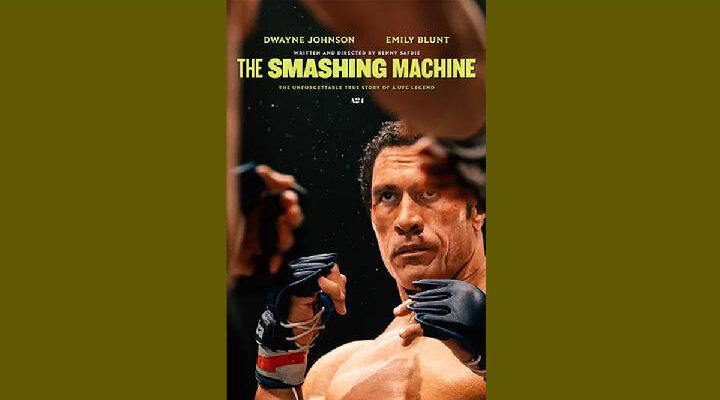Dwayne “The Rock” Johnson`s latest dramatic turn as MMA legend Mark Kerr in “The Smashing Machine” garnered critical praise but a surprisingly muted reception at the box office. This article explores the nuanced tale of a film that aimed for artistic depth and found itself navigating the complex currents of commercial viability.
In Hollywood’s grand tapestry, certain names are synonymous with box office gold. Among them, Dwayne “The Rock” Johnson stands as a titan, his very presence often guaranteeing a global audience. Yet, even the mightiest can encounter an unexpected challenge. Such is the recent narrative surrounding “The Smashing Machine,” an A24-produced biopic where Johnson sheds his larger-than-life persona to portray the tumultuous life of UFC Hall of Famer Mark Kerr.
A Dramatic Departure and Initial Acclaim
Directed by Benny Safdie, “The Smashing Machine” promised a gritty, unflinching look at Kerr’s journey through the brutal world of mixed martial arts, intertwined with his personal battles. Johnson`s transformation for the role was nothing short of remarkable, rendering him almost unrecognizable – a testament to his commitment to a part that strayed far from his usual action-hero fare. The film’s premiere was met with a resounding 15-minute standing ovation, signaling critical approval and artistic triumph. It seemed, for a moment, that Johnson had successfully crossed the chasm from commercial powerhouse to serious dramatic actor, a feat many of his peers have attempted with varying degrees of success.

The Unforgiving Numbers: A Box Office Reality Check
However, the applause from critics and industry insiders did not translate into a reverberating roar at the box office. During its opening weekend, “The Smashing Machine” earned a modest $5.9 million, placing it third against formidable competition. Taylor Swift’s “The Official Release Party of a Showgirl” commanded an astronomical $33 million, while “One Battle After Another,” starring Leonardo DiCaprio, secured $11 million. For a star of Johnson`s caliber, these figures represent his lowest-grossing opening weekend ever. With a production budget reportedly around $50 million, industry analysts project the film could face losses in the range of $10-15 million, a stark contrast to the initial critical euphoria.
It’s a peculiar dichotomy: a film lauded for its artistic merit and a star praised for his transformative performance, yet struggling to find its footing commercially. This scenario underscores the unpredictable nature of the modern cinematic landscape, where even established stars and critically acclaimed productions can be overshadowed by cultural phenomena or more traditionally accessible narratives.
The Rock Speaks: Performance Over Profit
Following the disappointing box office performance, Johnson took to Instagram, offering a statement that was both humble and reflective. Eschewing the typical Hollywood rhetoric of spin or deflection, he focused on the elements within his control.
“From deep in my grateful bones, thank you to everyone who has watched “The Smashing Machine”… In our storytelling world, you can’t control box office results. But what I realized you can control is your performance, and your commitment to completely disappear and go elsewhere. And I will always run to that opportunity. It was my honor to transform in this role for my director Benny Safdie… Truth is this film has changed my life.”
This sentiment, while gracious, subtly highlights the perennial tension between art and commerce in filmmaking. For Johnson, known for cultivating a brand built on global appeal and consistent commercial success, this artistic detour was clearly a personal triumph, irrespective of the financial outcome. It suggests a phase in his career where challenging roles and character immersion take precedence over raw box office power, a bold move for any actor, let alone one of his stature.
A Universe of Authenticity: The Combat Sports Connection
“The Smashing Machine” further distinguished itself by featuring authentic combat sports talent, lending an unparalleled layer of realism to the biopic. Heavyweight boxing champion Oleksandr Usyk made his major movie debut, portraying Ukrainian MMA legend Igor Vovchanchyn, one of Kerr’s notable foes. Former Bellator two-division champion and UFC veteran Ryan Bader stepped into the role of Mark Coleman, Kerr’s friend and training partner, adding another credible layer to the fight sequences and interpersonal dynamics. Even MMA legend Bas Rutten played himself, further blurring the lines between cinematic portrayal and historical accuracy.
This commitment to authenticity was undoubtedly a draw for combat sports enthusiasts and a testament to Safdie’s vision. However, whether this niche appeal was broad enough to contend with mainstream blockbusters and pop culture events remains a central question regarding the film`s commercial performance.
The Road Ahead for A24 and The Rock
For A24, the studio behind critically lauded and often artistically daring films like “Everything Everywhere All at Once” and “Moonlight,” “The Smashing Machine” represents another calculated risk. While their track record is often defined by critical acclaim and a dedicated cinephile audience, commercial success is not always guaranteed, especially for projects that don`t fit conventional molds. The studio`s willingness to back such a transformative role for Johnson demonstrates a continued dedication to provocative storytelling.
As for Dwayne Johnson, this experience may serve as a fascinating pivot point. It proves his capabilities beyond the muscle-bound hero and firmly establishes his intent to explore more nuanced characters. Whether this leads to a shift in his overall career trajectory or if he will continue to balance artistic endeavors with the crowd-pleasing blockbusters remains to be seen. One thing is clear: even for “The Rock,” the cinematic landscape is always full of unexpected rounds, sometimes won by knockout, sometimes by critical decision, and occasionally, a hard-fought battle that leaves the audience pondering the true meaning of victory.







